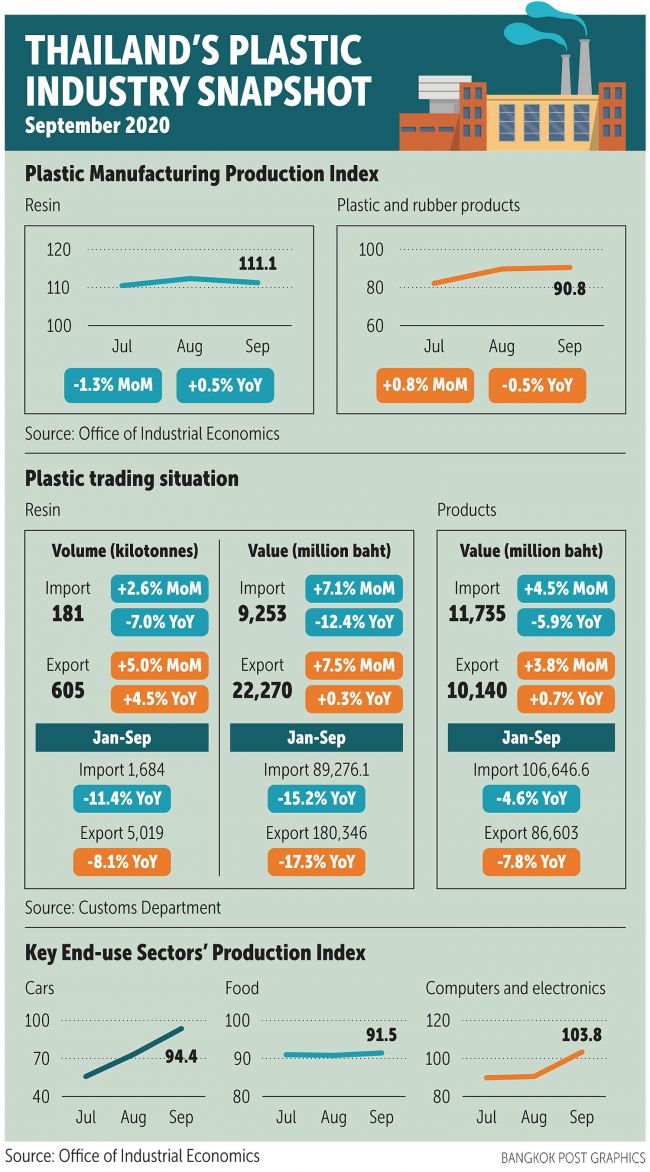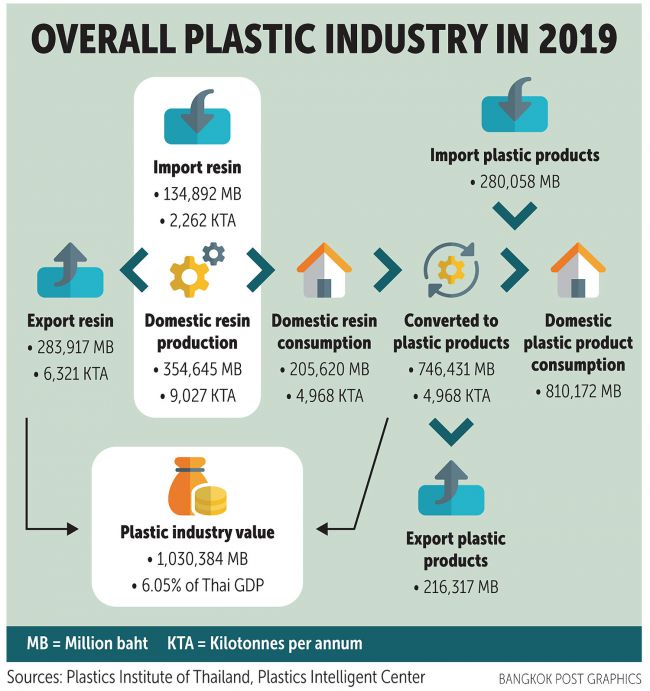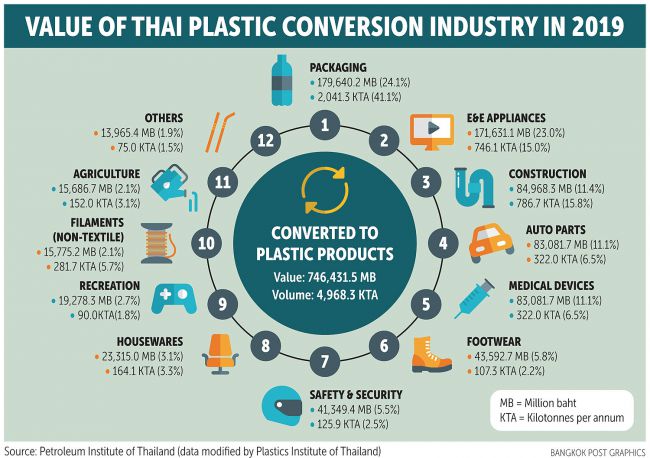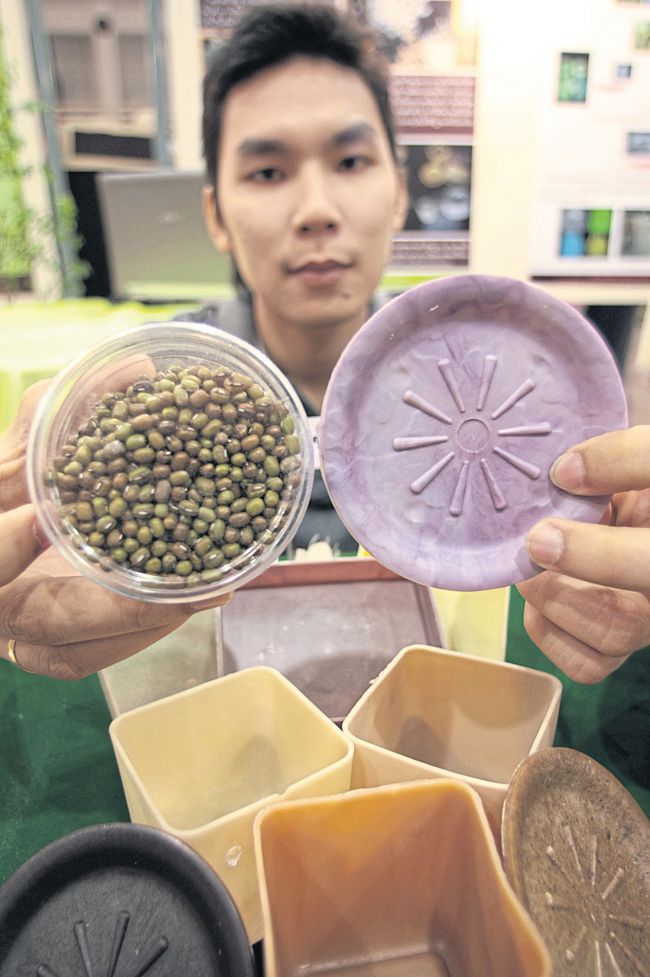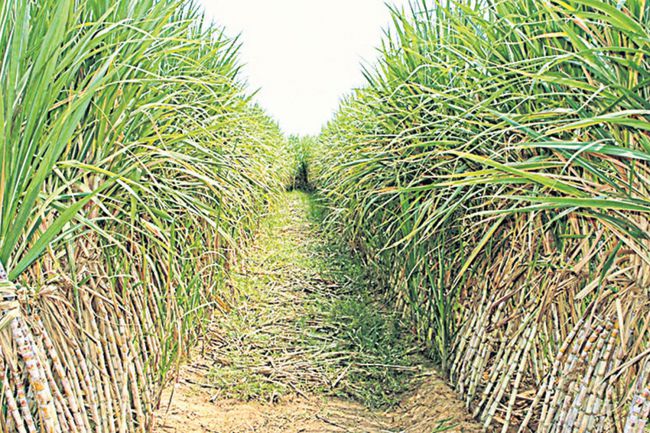
Sugar cane can become a new raw material for making plastics as part of the government’s bioeconomy scheme.
As the plastics industry continues to expand, the bioeconomy can generate handsome revenues for producers, but there is a great deal of environmental concern as most plastics are not biodegradable.
The concept of the bioeconomy, which promotes the use of renewable resources and waste products to make value-added products, has led some manufacturers to come up with creative ways of producing plastic, as well as developing other bio-based products and bioenergy.
Not only does a bioeconomy emphasise an environmentally friendly view of economic development, it also promises healthy revenue for farmers and business opportunities for plastics producers and other agricultural entrepreneurs.
Growth in demand
The Plastics Institute of Thailand (PITH) is forecasting bright prospects for the industry next year, thanks to strong demand in segments such as food and beverages, personal care and computers and electronics.
PITH president Veera Kwanloetchit believes the global plastic market, and particularly the packaging segment, will expand next year as plastic packaging and other plastic-based products have become an essential part of our daily lives.
“It was surprising to see plastic consumption increase during the pandemic,” he said.
“This seems in contrast to the campaign against plastic waste.”
The government launched a campaign to reduce plastic usage on Jan 1 this year, preventing shops from handing out single-use plastic bags to customers. But almost one year later, the demand for plastic beads, a raw material needed in various industries, has increased. An economic recovery will only intensify the demand for plastic, according to PITH.
Thailand is the largest producer of plastics in Asean. Factories, mostly based in the Map Ta Phut Industrial Estate in Rayong, produce a range of plastic materials from polypropylene (PP) and polyethylene (PE) to high-density polyethylene (HDPE) for domestic and overseas sales. There are around 3,000 plastic conversion companies in the country.
“In 2019, plastic bead consumption stood at 9 million tonnes,” said Mr Veera, adding that 2.5-3 million tonnes were imported.
Thailand also exports 2 million tonnes of plastics beads per year, mostly in the form of products.
The value of the output generated by the plastics industry is valued at 1.1 trillion baht for the country, representing 7.28% of GDP.
Bioplastics
The government has a policy to promote manufacturing processes that are more friendly to the environment and, PITH believes, the plastics sector can follow this policy under the bioeconomy concept.
PITH, a state agency under the Industry Ministry, supports innovations that will put the Thai plastics industry on a path of sustainable growth.
One mission is to connect the development of plastics in tandem with the sugar industry. The government aims to support sugar cane farmers by increasing cane prices and developing high value-added products, said Ekapat Wangsuwan, secretary-general of the Office of the Cane and Sugar Board (OCSB). The production of bioplastics using sugar offers a good deal of promise, he said.
Different materials require varying technologies and methods to produce plastic. To make plastic from a renewable source, the molecular structure of polymers need to be isolated.
Typically polymers are synthesised by chemicals, but they can also be made through the fermentation of sugars. Lactic acid extracted from sugar cane is crucial in this step.
Sugar cane plantations cover 11.4 million rai in 47 provinces of Thailand. There are 57 sugar mills in the country, with a capacity of 983,587 tonnes per day.
Thailand is the world’s fourth largest sugar producer and the second biggest exporter following Brazil.
Biochemical products such as bioplastics can help make crop prices more stable, even increasing them over the long term.
Local farmers should be able to take advantage of this aspect of the bioeconomy, said Mr Ekapat.
“The OCSB encourages manufacturers to use sugar cane as a raw material for bioplastics and biochemical production processes,” he said.
Bioplastics can be used for a range of new products including mask filters, medical gloves and cosmetics.
This development is part of the state’s ambitious plan to make Thailand the biochemical industry hub of Asean by 2027. This includes bioplastics, biochemicals and biopharmaceutical production.
The government also wants the bioeconomy to help Thailand escape the middle-income trap.
The country’s economy rose from low-income, but remains stuck in the middle. Thai GDP per capita reached US$7,605 in 2018, compared with $6,882 in 2017.
Biochemicals
Another plank in the government’s bioeconomy manifesto is promoting the biochemical industry. Nakhon Sawan province was chosen as a suitable location for production facilities, known as the Nakhon Sawan Bio Complex, or NBC.
Darat Vibhatakalasa, deputy chief executive of Kaset Thai International Sugar Corporation (KTIS), said her company is proceeding with first-phase development of NBC, although its investment, originally set at 7.5 billion baht, would need to be adjusted. She said the company has been in negotiations with Global Green Chemicals (GGC) regarding the investment figure.
Negotiations are expected to be concluded early next year, said Ms Darat.
NBC will be developed over two phases, requiring a total investment of 40 billion baht, with an equal investment from the two companies.
The project, located on 2,000 rai in Takhli district Nakhon Sawan, emphasises high-tech biochemicals, including biopharmaceutical development.
The first phase calls for a sugar-cane crushing unit with a daily capacity of 24,000 tonnes; an ethanol production plant with a daily capacity of 600,000 litres per day; a biomass power plant with 85 megawatts of capacity; and steam generation of 475 tonnes per hour.
The first phase is slated to start commercial operations in the first quarter of 2021.
“The government chose Nakhon Sawan because the province has large areas of sugar cane fields,” said Ms Darat. “There are plenty of raw materials to supply the biochemical industry.”
Authorities also have biochemical development plans for other provinces, including Khon Kaen and Kamphaeng Phet, because they have plenty of raw materials such as sugar cane and cassava.
KTIS is urging the government to increase investment incentives and privileges to support NBC. The current packages are insufficient to attract a large-scale biochemical industry, she said.
“We previously asked the government to provide the same incentives as those granted for investment in the EEC,” said Ms Darat, referring to the Eastern Economic Corridor, the state’s touted hub of modern industry on the eastern coast.
“Foreign investors that want to join the NBC project also want the government to help with infrastructure development in the area.”
State support is also needed for the second-phase development of NBC, which focuses on the manufacture of high value-added products in the bioplastics, biochemical and biopharmaceutical fields for domestic and overseas sales, she said.
Thailand can produce these goods because it is one of the world’s major agricultural production bases, offering great potential for bioeconomy development, said Ms Darat.
The bioeconomy is also part of the Pracha Rat scheme, which means people’s state, a government effort to promote value-added agricultural products and increase household incomes.
“We can increase the value of farm products such as sugar cane, cassava and rice, while the government develops biochemical projects,” she said.

